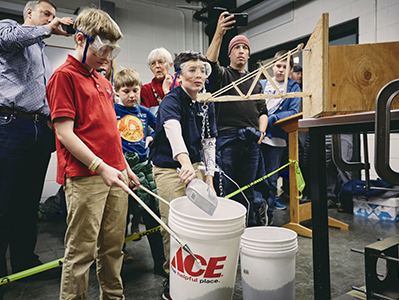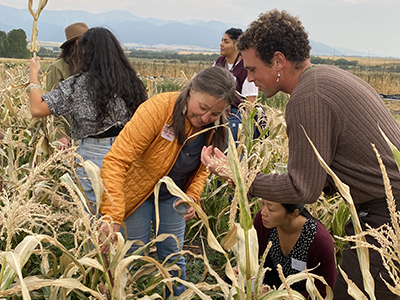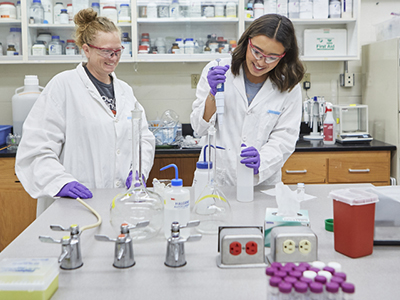EHHD Grant Resources & Opportunities
Resources and opportunities for the Montana State University College of Education, Health and Human Development faculty, staff, and students.
EHHD Internal Grants
See below for information on how to apply for 2026 EHHD Internal Grants.
- Kalli Decker used Professional Development funds to mimic what her students are required to do when they enter the Early Childhood Education workforce so that she could adjust her coursework to meet those expectations. She also used the subsequent process of co-teaching in some early childhood classrooms to share professional development tips (based on current research) with the other teachers.
- Fenqjen Luo deployed “Interdisciplinary Research Implementation” funds to visit multiple Reservation schools to cultivate partnerships and complete a $3M pending collaborative proposal to NSF/Noyce for Rural and American Indian School Educators as Science, Technology, Engineering, and Mathematics Leaders.
- Gilbert Kalonde used “Interdisciplinary Team Development” funds to visit high schools and community colleges in Los Angeles and generate strategies for recruitment and transfer of diverse students of color into MSU’s STEM teacher preparation programs. In addition to building relationships, he was able to present the work at a professional conference.
- Mary Miles used a “GRA Support” mini-grant to enable Master’s Exercise and Nutrition Sciences student, Lindsay Lee, to analyze tissue samples for inflammation, testing the utility of certain DNA primers; and to develop a manuscript on the pilot level analysis.
- Karie Orendorff used a “Manuscript Completion” mini-grant to help her submit 4 papers about optimal physical activity approaches in schools and classrooms. Karie also used a “Research Supplies” mini-grant to cover focus group transcription services to assist her manuscript development.
- Marcie Reuer used an “Early Career Mentoring” mini-grant to create and make presentations on K-12 STEM education, and to collaborate with mentor Nick Lux to develop a case study of how rural STEM teachers use local community assets in their teaching.
Call for Internal Grant (“What do you Need?”) Proposals FY26 [up to $5000]
Eligible: TT and NTT Faculty
- Are you running short of funds for something key to continuing or advancing your research program?
- Are you undertaking a new project that needs some startup funding?
If either of these apply to you, the College has a limited number of $3000-$5000 internal grants to offer during FY26 (through June 15, 2026). Note: EHHD’s Office of Scholarship Development and Academic Impact is creating events this fall to help PIs in securing new funding sources. Recipients are expected, if possible, to attend these Tuesday lunch-time events during Fall 2025: 9/16 ; 10/14; 11/18. By the beginning of spring 2026, we’d appreciate your feedback on how you followed up after these events, for example: reaching out to the presenters for one-on-one meetings, setting up a GrantForward profile, creating a Foundation white paper, etc.
APPLICATION PROCESS
Please submit to Elizabeth Bird a Word document with the following information:
- Name (s)
- Project title
- Project description (including a description of any current and pending support) 500 words
- Description of how the project supports and meets a critical need to advance your research agenda 250 words
- Description of how the project could result in an external grant proposal 250 words
- Budget needed to meet the immediate need, how you arrived at your budgeted amounts, and description of how seed grant funds will be allocated for what uses (Budget Narrative 250 words total)
- Description of how you are presently, and have recently been, engaged with your program, department and the college community, e.g. intra-college/department/program events and meetings attended, volunteer activities, or service (250 words). You may describe this with bullet points if appropriate.
Application information & Award conditions:
- Deadline: rolling during AY2025-26 until the available funds have been allocated.
- Expenditures must be completed by June 15, 2026.
- Please submit your application to: Elizabeth Bird, ebird@montana.edu.
- The review committee will comprise the Associate Dean for Research, the Project Development/Grant Specialist and the EHHD Research Enhancement Committee.
- New awardees will attend an EHHD fiscal training before funds can be spent.
- Awardees are expected to submit a paragraph describing their work to Becky Stanton for an EHHD publication, news article, or video.
- Awardees must have attended (or plan to attend) OSP’s PI training.
Criteria for Evaluation:
- Contribution to the principal investigator(s)’s coherent research agenda (25%)
- Likelihood of the project leading to scholarly outputs such as manuscripts or presentations etc. (20%)
- Likelihood of obtaining future external grant funding to support this work (35%)
- Budget clarity (10%)
- Current college/department/program engagement (10%)
EHHD Research Policies and Forms
Ideally submit the LOI form 4 weeks before your proposal is due and at least a week
before you submit the ePCF (Office of Sponsored Programs' electronic Proposal Clearance
Form) so any questions or concerns can be resolved early. This DocuSign form is to
be filled on-line.
Note: The LOI is required for all external sources of funds payable to the institution
on your behalf (e.g. including subawards, but not private consulting arrangements
that bypass MSU). LOIs also should be submitted for internal MSU grants except those invited by the EHHD Dean, or those submitted through the Department Head and
Dean (such as Faculty Excellence Grants).




